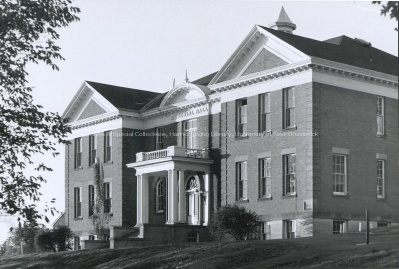Memorial Hall: Difference between revisions
mNo edit summary |
mNo edit summary |
||
| (2 intermediate revisions by one other user not shown) | |||
| Line 7: | Line 7: | ||
'''Sod Turning:''' 1923 | '''Sod Turning:''' 1923 | ||
'''Cornerstone Laying:''' 3 July 1923 by Governor General Vimy | '''Cornerstone Laying:''' 3 July 1923 by Governor General Lord Byng of Vimy | ||
'''Opened for Use:''' 1924 | '''Opened for Use:''' 1924 | ||
| Line 15: | Line 15: | ||
'''Architect:''' F. Neil Brodie | '''Architect:''' F. Neil Brodie | ||
'''Named for:''' Named in commemoration of UNB students and alumni that fought and died in the First World War. | '''Named for:''' Named in commemoration of UNB students and alumni that fought and died in the First World War. Families of the deceased contributed to the construction costs of Memorial Hall. | ||
'''Renovations/changes/additions:''' The first two stained glass windows were unveiled in 1926, one in memory of The Earl of Ashburnham (depicted is Shakespeare reading to Queen Elizabeth I) and the other in memory of Lieutenant George Paget Owen. In 1927 a large window over the stage was installed by UNB alumnus W.D. Rankin in memory of his son and daughter (depicted is the triumph of good over evil from Milton's ''Paradise Lost''). A window was donated by alumnus F.R. Taylor (depicted are scenes from the poetry of Robert Burns) in 1929. A memorial window dedicated to Loring W. Bailey was unveiled on 14 May 1931 (depicted are scenes from Longfellow’s poetry). The final two windows were unveiled on Founder's Day, 22 January 1943, one in memory of Sir John Douglas Hazen and the other for Dr. Henry Seabury Bridges (depicted is Aristotle instructing his followers). The building was renovated in 1970. | '''Renovations/changes/additions:''' The first two stained glass windows were unveiled in 1926, one in memory of The Earl of Ashburnham (depicted is Shakespeare reading to Queen Elizabeth I) and the other in memory of Lieutenant George Paget Owen Fenwick. In 1927 a large window over the stage was installed by UNB alumnus W.D. Rankin in memory of his son and daughter (depicted is the triumph of good over evil from Milton's ''Paradise Lost''). A window was donated by alumnus F.R. Taylor (depicted are scenes from the poetry of Robert Burns) in 1929. A memorial window dedicated to Loring W. Bailey was unveiled on 14 May 1931 (depicted are scenes from Longfellow’s poetry). The final two windows were unveiled on Founder's Day, 22 January 1943, one in memory of Sir John Douglas Hazen and the other for Dr. Henry Seabury Bridges (depicted is Aristotle instructing his followers). The building was renovated in 1970. | ||
'''Notes:''' Originally both a Science building and a convocation hall, Memorial Hall has housed physics, chemistry, chemical engineering, electrical engineering and physical education and a dining hall. Two radio stations, CFNB and CHSR, began broadcasts from the basement. Currently Memorial Hall is home to the UNB Art Centre and the Centre for Musical Arts. | '''Notes:''' Originally both a Science building and a convocation hall, Memorial Hall has housed physics, chemistry, chemical engineering, electrical engineering and physical education and a dining hall. Two radio stations, CFNB and CHSR, began broadcasts from the basement. Currently Memorial Hall is home to the UNB Art Centre and the Centre for Musical Arts. The memorial tablet over the entry to the auditorium lists 35 names of UNB graduates who died during World War I. | ||
'''Source(s):''' | '''Source(s):''' | ||
Latest revision as of 14:23, 31 October 2022
Building Name: Memorial Hall
Other Names: Memorial Building, Mem Hall
Civic Address: 9 Bailey Dr.
Sod Turning: 1923
Cornerstone Laying: 3 July 1923 by Governor General Lord Byng of Vimy
Opened for Use: 1924
Official Opening: 19 May 1925 (Dedication) by Sir George E. Foster
Architect: F. Neil Brodie
Named for: Named in commemoration of UNB students and alumni that fought and died in the First World War. Families of the deceased contributed to the construction costs of Memorial Hall.
Renovations/changes/additions: The first two stained glass windows were unveiled in 1926, one in memory of The Earl of Ashburnham (depicted is Shakespeare reading to Queen Elizabeth I) and the other in memory of Lieutenant George Paget Owen Fenwick. In 1927 a large window over the stage was installed by UNB alumnus W.D. Rankin in memory of his son and daughter (depicted is the triumph of good over evil from Milton's Paradise Lost). A window was donated by alumnus F.R. Taylor (depicted are scenes from the poetry of Robert Burns) in 1929. A memorial window dedicated to Loring W. Bailey was unveiled on 14 May 1931 (depicted are scenes from Longfellow’s poetry). The final two windows were unveiled on Founder's Day, 22 January 1943, one in memory of Sir John Douglas Hazen and the other for Dr. Henry Seabury Bridges (depicted is Aristotle instructing his followers). The building was renovated in 1970.
Notes: Originally both a Science building and a convocation hall, Memorial Hall has housed physics, chemistry, chemical engineering, electrical engineering and physical education and a dining hall. Two radio stations, CFNB and CHSR, began broadcasts from the basement. Currently Memorial Hall is home to the UNB Art Centre and the Centre for Musical Arts. The memorial tablet over the entry to the auditorium lists 35 names of UNB graduates who died during World War I.
Source(s):
- Leroux, John. Building A University: The Architecture of UNB. Fredericton: Goose Lane Editions, 2010, p. 36-39.
- UA Case 123; Section 3, Box 2; Memorial Hall.
© UNB Archives & Special Collections, 2014
